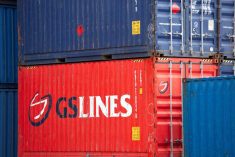Cairo | Reuters — Egypt has tightened its agriculture quarantine regulations, imposing a rule that will prevent grain shipments suspected of contamination from being offloaded until they receive test results, according to a letter sent to traders Monday.
The rule comes just one month after the world’s biggest wheat buyer discontinued its controversial zero tolerance policy on ergot, a common grains fungus, in favour of the international standard of 0.05 per cent. It ends a months-long dispute over import policy that saw suppliers raise prices and boycott state tenders.
Read Also

U.S. grains: Soybeans continue gains on Trump’s China comments
Chicago | Reuters – Chicago Board of Trade soybeans continued a three-day rally on Friday, fuelled by President Donald Trump’s…
The new grains import restriction, reviewed by Reuters, will prevent shipments spotted with any level of a contaminant, including ergot, from being offloaded until test results show they comply with quarantine regulations. That is in contrast to old rules that allowed for testing after discharge.
The new rule may raise costs for suppliers forced to pay fees to hold their shipments at the port for extended periods.
It comes amid renewed uncertainty over ergot policies after the discharge of 33,000 tonnes of Russian wheat was abruptly halted at the port of Damietta after arriving on July 22 and being suspected of containing ergot.
The spokesman for the agriculture ministry could not confirm whether the shipment had been rejected or what level of ergot it may contain, but said that samples from it were being tested.
The company responsible for the shipment said it had not received any notification that the shipment was rejected but was told by the health ministry, which conducts its own tests, that the cargo was ergot-free.
A U.S. Department of Agriculture report earlier this year found that Egypt will spend up to US$100 million this year because of unusual inspection and sampling policies for wheat shipments and other “burdensome tender requirements” that make government wheat imports more expensive.
— Reporting for Reuters by Eric Knecht and Maha El Dahan.















